If you are a patient, please click here. The information below is a guide for staff, trainees, students, and faculty of UW Medicine.
WHY do we need certified medical interpreters?
Patients are First
Patients are First means serving all patients and family members with compassion, respect, and excellence. In addition, UW Medicine is committed to being anti-racist, inclusive, and equitable organization and strives to provide the highest quality, safest, and most effective care for all patients. This includes placing the patient’s needs first through effective, patient/family centered communication. Every patient. Every time.
Quality and Safety
Effective communication is fundamental for safe and high-quality care in which patients/ families participate actively.
Federal Law & Regulatory Requirements
The Joint Commission requires hospitals to identify the patient’s preferred language for discussing health care and provide language interpreting and translation services to effectively communicate with patients. Equal access for LEP (Limited English Proficiency) and Deaf/DeafBlind/hard of hearing patients is mandated by Section 1557 of the Affordable Care Act, Title VI of the Civil Rights Act and the Americans with Disabilities Act. As a state entity that receives Federal funds, we are required by law to provide reasonable accommodations for language access.
WHO should interpret?
A certified medical interpreter, not a family member. A certified medical interpreter, not a co-worker. Staff who speak other languages but have not been assessed cannot interpret and are expected to use certified medical interpreters (staff language assessment programs are different at each location – please reach out to your manager or lead to see if it is an option). Lastly, automated or computer-based translators (e.g. Google Translate, on-line dictionaries, etc.) must not be used in lieu of an interpreter/translator.
Interpreter services is your partner to best meet the patient’s needs. Please reach out to the teams at your location.
HOW do I request a certified medical interpreter?
UW Medical Center – Montlake, Northwest
Monday – Friday, 7:00am – 5:00pm
Outpatient: Interpreter Services will be alerted and assigned in Epic if the patient’s language is listed other than English.
Inpatient/Same Day Requests: Either call
After-hours: Call
Telephonic Interpreters (available 24/7/365) Call
To request a certified medical interpreter for patients or family members who are Deaf/DeafBlind/hard of hearing, send a detailed email to uwmcasl@uw.edu
Video Interpretation: Devices are available in clinics and inpatient units across Montlake and Northwest Campuses. Click Here for more information.
Questions? Contact intrpsvc@uw.edu
If you’d like to learn more visit UWMC Interpreter Services OR Interpreter Services Corner
Harborview Medical Center
Outpatient: Interpreter Services will be alerted and assigned in Epic if the patient’s language is listed other than English.
Inpatient/Same Day Requests: Call
Planned surgery: For spoken languages use the Ambulatory Surgery Interpreter Request Form and for signed languages use the Ambulatory Surgery Interpreter Request Form for Deaf or Deaf/Blind Patients
Advance Requests: Interpreter Request Form
Telephonic Interpreters (available 24/7/365) Call
- For Spanish Interpreters – Press 2
- For Somali Interpreters – Press 3
- For Vietnamese Interpreters – Press 4
- For Russian Interpreters – Press 5
- For all other languages – Press 9
To request a certified medical interpreter for patients or family members who are Deaf/DeafBlind/hard of hearing: Call
Questions? Contact hmc-interpreter-svcs@uw.edu
If you’d like to learn more visit HMC Interpreter Services
Primary Care Clinics
Universal Language Services
Call
View the website here. For help, see the User Guide
Questions? Contact accounts@ulsonline.net
UW Interpreter Phone Line
Call
Stratus (Hearing and Deaf Video interpretation): Language Services with AMN Healthcare
Questions? Contact info@amnhealthcare.com
Valley Medical Center
To request interpreters or download the app on your phone, please visit Interpreter Services
WHICH type of modality should I use?
Below are examples to understand which modality can help best meet the patient and provider needs. If you are not sure or have questions, please reach out to the interpreter services team at your location.
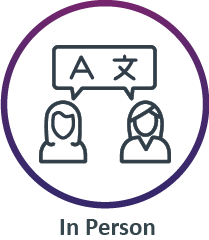
- New medical history and physical exam
- Major or high risk procedure
- Consent for procedures, living wills, and healthcare power of attorney
- Significant physical/emotional trauma or anxiety
- Sharing serious, worsening, or terminal health diagnoses or abnormal test results
- Labor and infant delivery
- Children who need to communicate with their provider
- Family conferences, health education classes, or hands-on training
- Mental health evaluations and therapy
- Patients who are vulnerable or have cognitive impairments
- Patients who are deaf, deaf blind or hard-of-hearing

- When an in-person interpreter is needed but not available, and over the phone is not adequate
- ED triage or patient rooming
- Simple or routine clinic visits
- Diagnostic imaging and screenings
- Follow up appointments (which don’t involve a new diagnosis, new treatment, teaching, or sensitive conversations)
- Social work, nutrition, consultation, weight management

- When an in-person or video interpreter is needed but not available
- Brief conversations such as food menu decisions, scheduling appointments, or billing
- Routine results, medication refills and instructions
- Conversations when the patient is not physically on site
- Impromptu conversations that are not scheduled or planned
HOW to best partner with a certified medical interpreter?
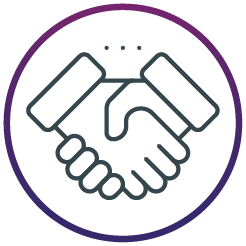
Certified medical interpreters are key members of our healthcare teams.
Start by…
Introducing yourself to the interpreter
Share the goal, the nature of the visit, and ask for relevant cultural input
Encourage the interpreter to ask for clarification if they don’t understand something you said
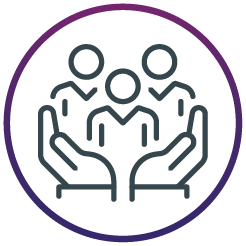
During the appointment…
Do
Assure the patient we are ALL bound by confidentiality
Repeat that anything anyone says will be interpreted
Speak directly to the patient, not to the interpreter
Note: During examinations, you may ask the interpreter to stand behind a curtain for patient privacy.
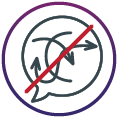
Avoid
Asking multiple questions and using metaphors (“up in the air”, “hard to nail down”, “lots of moving parts”)
Complicated, unnecessary, or vague sentences:
“To start off real quick, let’s go through your medications” Try instead: “Let’s go through your medications”
“What brings you in today?” (If you ask this, the patient’s answer might be “the bus”) Try instead: “How can we help you?”
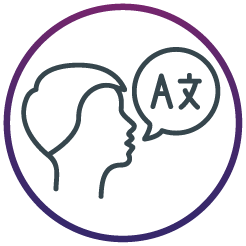
After the appointment…
Briefly check in with the interpreter by asking:
“How are you doing?”
“Is there additional cultural information that will help me to care for this patient?”
“Is there anything I could have done differently to help with your interpretation?”
“Thank you for your time.”
WHAT do I do if a friend or family member asks to interpret?

If the friend/family member asks to interpreter, you could say…
“I really appreciate your willingness to help, but I am required to have a certified medical interpreter. It’s important that you are here as a support to your friend/family member.”
If the friend/family member asks again or is reluctant, you can ask…
“Can you tell me more about why you would like to help interpret?”
This can help you understand more about possible hesitations, cultural backgrounds, concerns about confidentiality, etc. Please reach out to your lead or the interpreter services team for help with addressing the patient’s concerns.
If the concerns are addressed and the friend/family member continues to ask to interpret, please repeat…
“There are policies and laws we must follow to provide the best care for our patients by using a certified medical interpreter.”
IT’S AN EMERGENCY, what should I do?

Do not delay care
Attend to the emergency in the most appropriate way given the circumstances.
If possible, staff should attempt to access a certified medical interpreter via phone or video.

Chart
Always chart use of any interpreter, be they qualified or ad hoc (minors under 18 are never used to interpret, even in an emergency). If a certified medical interpreter was not accessed, chart the reason why.

Reassess
Once the situation has stabilized, make plans for a certified medical interpreter to be present to provide an update to the patient, family members, or friends.
This has been created to ensure optimal communication occurs between staff and patients/companions who are deaf, blind, deaf/blind, hard of hearing, non-English Speaking, or have limited proficiency in English in order to facilitate care at University of Washington Medical Center and to comply with the Title VI of the Civil Rights Act of 1964, the Americans with Disabilities Act, 42 U.S.C. § 12101, et sec. (ADA). If certified medical interpreters are not used during patient care, potential consequences could include impacting patient care and potential legal and regulatory repercussions.
Want to learn more? Here are recommendations from Interpreter Services…
Professional Language Interpretation and Inpatient Length of Stay and Readmission Rates
The high costs of language barriers in medical malpractice
Promoting appropriate use of physicians’ non-English language skills in clinical care
The truth about language barriers: one residency program’s experience
Impact of language proficiency testing on provider use of Spanish for clinical care